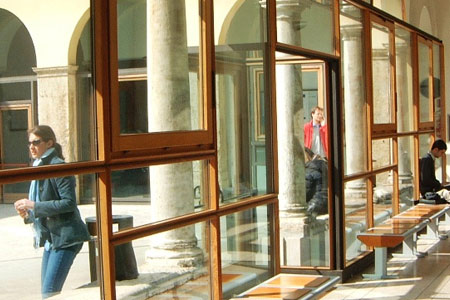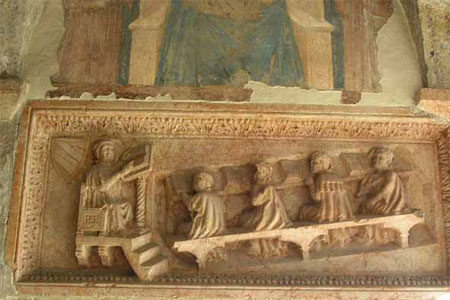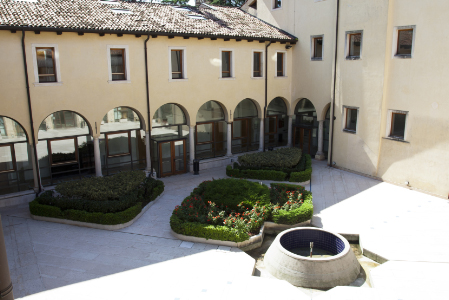|
Combined Bachelor's + Master's degree in Law
Course partially running
|
Comparative constitutional law (2025/2026)
|
6
|

|
6
|
|
|
Master's degree in Law for Technologies and Sustainable Innovation
|
Global comparative law (2025/2026)
|
6
|
|
6
|
|
|
PhD in European and International Law
|
"Becoming a Scholar": Building a Research Career in the (Hyper?)Modern Academy – One Academic's Perspective (2025/2026)
|
0.5
|
|
0.5
|
|
|
Master's degree in Emergency Governance
|
Geopolitica della complessità (2025/2026)
|
15
|

|
3
|
METODOLOGIE GIURIDICO-COMPARATISTICHE E GOVERNANCE DEI MUTAMENTI
|
|
1
|
TRADIZIONI COSTITUZIONALI COMPARATE NON EUROCENTRICHE
|
|
Master's degree in Emergency Governance
|
Gestione dei processi emergenziali (2025/2026)
|
12
|

|
3
|
GEOGRAFIA GIURIDICA
|
|
Master's degree in Emergency Governance
|
Industria, logistica, innovazione. Il ruolo strategico dell'Italia nel futuro della UE e nei nuovi equilibri geopolitici del Mediterraneo allargato (2025/2026)
|
2
|
|
|
|
|
Master's degree in Emergency Governance
Course partially running
|
Lab.: AI and the law (2025/2026)
|
1
|
|
|
|
|
Master's degree in Emergency Governance
Course partially running
|
La governance della protezione civile dalla resilienza al disaster recovery (2025/2026)
|
1
|
|
|
|
|
Master's degree in Emergency Governance
|
La governance della protezione civile dalla resilienza al disaster recovery (2025/2026)
|
1
|
|
|
|
|
PhD in European and International Law
|
Legal Transplants (2025/2026)
|
0.5
|
|
0.5
|
|
|
PhD in European and International Law
|
Metodi qualitativi e quantitativi nella comparazione giuridica (2025/2026)
|
1
|

|
1
|
|
|
Master's degree in Emergency Governance
|
Project work - occhi aperti sul territorio (2025/2026)
|
2
|
|
|
|
|
PhD in European and International Law
|
Tradizioni costituzionali europee comparate. Lezioni dalla storia d'Europa (2025/2026)
|
0.5
|
|
0.5
|
|
|
Corso di Perfezionamento e Aggiornamento Professionale in Domini Collettivi: accertamento e gestione con particolare riferimento al nord est d'Italia
|
Tutela ambientale (2025/2026)
|
1
|
|
0.25
|
(Parte II: Domini collettivi e tutela ambientale - analisi della normativa in materia ambientale e collegamento con usi civici, analisi della giurisprudenza costituzionale)
|
|
Combined Bachelor's + Master's degree in Law
Course partially running
|
Comparative constitutional law (2024/2025)
|
6
|

|
6
|
|
|
Master's degree in Emergency Governance
Course partially running
|
Comparative constitutional traditions and governance of change
(2024/2025)
|
9
|

|
9
|
|
|
Master's degree in Law for Technologies and Sustainable Innovation
Course partially running
|
Global comparative law (2024/2025)
|
6
|

|
6
|
|
|
Master's degree in Emergency Governance
Course partially running
|
PROJECT WORK - AMALGAMA CBRN (FIRST AID AND CCA MED LINE) (2024/2025)
|
1
|
|
|
|
|
Bachelor’s degree in Communication Studies
Course partially running
|
Pillole di sostenibilità (2024/2025)
|
1
|
|
1
|
|
|
Master's degree in Emergency Governance
Course partially running
|
An introduction to Emergency Management (2023/2024)
|
3
|
|
|
|
|
Master's degree in Emergency Governance
Course partially running
|
Civil protections: the role of local councils (2023/2024)
|
1
|
|
|
|
|
Combined Bachelor's + Master's degree in Law
Course partially running
|
Comparative constitutional law (2023/2024)
|
6
|

|
6
|
|
|
Master's degree in Emergency Governance
Course partially running
|
Comparative constitutional traditions and governance of change
(2023/2024)
|
9
|

|
9
|
|
|
PhD in European and International Law
|
Free choice teaching activities (2023/2024)
|
5
|
|
1
|
Diritto e geografia: metodologia e applicazioni
|
|
Master's degree in Law for Technologies and Sustainable Innovation
Course partially running
|
Global comparative law (2023/2024)
|
6
|

|
6
|
|
|
Master's degree in Emergency Governance
Course partially running
|
Operation of the “3° Stormo”, theoretical and practical logistics management and planning in emergency contexts (2023/2024)
|
1
|
|
|
|
|
Master's degree in Emergency Governance
Course partially running
|
Project work - Emergency management in Italy (2023/2024)
|
1
|
|
|
|
|
Master's degree in Emergency Governance
Course partially running
|
Project Work - The emergency phase: civil protection interventions (2023/2024)
|
1
|
|
|
|
|
PhD in European and International Law
|
Teaching activities prof. Nicolini (2023/2024)
|
5
|
|
1
|
Diritto e geografia: metodologia e applicazioni
|
|
Master's degree in Emergency Governance
Course partially running
|
An introduction to Emergency Management (2022/2023)
|
3
|
|
|
|
|
Master's degree in Emergency Governance
Course partially running
|
An introduction to Project Management (2022/2023)
|
3
|
|
|
|
|
Master's degree in Emergency Governance
Course partially running
|
Civil protections: the role of local councils (2022/2023)
|
1
|
|
|
|
|
Combined Bachelor's + Master's degree in Law
Course partially running
|
Comparative constitutional law (2022/2023)
|
6
|

|
6
|
|
|
Master's degree in Emergency Governance
Course partially running
|
Comparative constitutional traditions and governance of change
(2022/2023)
|
9
|

|
9
|
|
|
Master's degree in Law for Technologies and Sustainable Innovation
Course partially running
|
Global comparative law (2022/2023)
|
6
|

|
6
|
|
|
Combined Bachelor's + Master's degree in Law
Course partially running
|
Landscape and law in the Veneto region. A course of lectures (2022/2023)
|
2
|
|
|
|
|
Master's degree in Emergency Governance
Course partially running
|
Project work - Emergency management in Italy (2022/2023)
|
1
|
|
|
|
|
Master's degree in Emergency Governance
Course partially running
|
Infrastrutture, logistica e industria: strategie ed azioni nella nuova globalizzazione (2022/2023)
|
2
|
|
|
|
|
Master's degree in Emergency Governance
Course partially running
|
Civil protections: the role of local councils (2021/2022)
|
1
|
|
|
|
|
Combined Bachelor's + Master's degree in Law
Course partially running
|
Comparative constitutional law (2021/2022)
|
6
|

|
6
|
|
|
Master's degree in Emergency Governance
Course partially running
|
Comparative constitutional traditions and governance of change
(2021/2022)
|
9
|

|
9
|
|
|
Master's degree in Emergency Governance
Course partially running
|
Doing green business: individuals and sustainable communities (2021/2022)
|
1
|
|
|
|
|
Master's degree in Emergency Governance
Course partially running
|
Emergency management and airports (2021/2022)
|
1
|
|
|
|
|
Master's degree in Emergency Governance
Course partially running
|
European civil protections mechanism: Resceu – Theory and practice (2021/2022)
|
1
|
|
|
|
|
Master's degree in Law for Technologies and Sustainable Innovation
Course partially running
|
Global comparative law (2021/2022)
|
6
|

|
6
|
|
|
Master's degree in Emergency Governance
Course partially running
|
H2o: (in)finite resource? (2021/2022)
|
1
|
|
|
|
|
Bachelor’s degree in Humanities
Course partially running
|
Ci sto? Affare fatica (2021/2022)
|
1
|
|
1
|
|
|
Bachelor's degree in Languages and Cultures for Tourism and International Commerce
Course partially running
|
Comparative and European Public law [Cognomi M-Z] (2020/2021)
|
9
|

|
9
|
|
|
Combined Bachelor's + Master's degree in Law
Course partially running
|
Comparative constitutional law (2020/2021)
|
6
|

|
6
|
|
|
Master's degree in Emergency Governance
Course partially running
|
Comparative constitutional traditions (2020/2021)
|
6
|

|
6
|
|
|
Combined Bachelor's + Master's degree in Law
Course partially running
|
GEOLawB - Laboratory on Law and Spatiality (1 item) (2020/2021)
|
1
|

|
|
|
|
Combined Bachelor's + Master's degree in Law
Course partially running
|
GEOLawB - Laboratory on Law and Spatiality (2 items) (2020/2021)
|
2
|

|
|
|
|
Combined Bachelor's + Master's degree in Law
Course partially running
|
GEOLawB - Laboratory on Law and Spatiality (3 items) (2020/2021)
|
3
|

|
|
|
|
Master's degree in Emergency Governance
Course partially running
|
TACKLING HYDROLOGICAL INSTABILITY. BEST PRACTICES AND RISK MITIGATION (2020/2021)
|
1
|

|
|
|
|
Bachelor's degree in Languages and Cultures for Tourism and International Commerce
Course partially running
|
Comparative and European Public law [Cognomi M-Z] (2019/2020)
|
9
|

|
9
|
|
|
Combined Bachelor's + Master's degree in Law
Course partially running
|
Comparative constitutional law (2019/2020)
|
6
|

|
6
|
|
|
Master's degree in Emergency Governance
Course partially running
|
Comparative constitutional traditions (2019/2020)
|
6
|

|
6
|
|
|
Master's degree in Emergency Governance
Course partially running
|
GARDENS IN REVOLUTION: STRATEGIC NETWORKS FOR COMMON GREENING (2019/2020)
|
1
|
|
|
|
|
Combined Bachelor's + Master's degree in Law
Course partially running
|
GEOLawB - Laboratory on Law and Spatiality (2019/2020)
|
3
|
|
|
|
|
Bachelor's degree in Languages and Cultures for Tourism and International Commerce
Course partially running
|
Comparative and European Public law [Cognomi M-Z] (2018/2019)
|
9
|

|
9
|
|
|
Combined Bachelor's + Master's degree in Law
Course partially running
|
Comparative constitutional law (2018/2019)
|
6
|

|
6
|
|
|
Master's degree in Emergency Governance
Course partially running
|
Comparative constitutional traditions (2018/2019)
|
6
|

|
6
|
|
|
Bachelor's degree in Languages and Cultures for Tourism and International Commerce
Course partially running
|
Comparative and European Public law [Cognomi A-L] (2017/2018)
|
9
|

|
6
|
|
|
Master's degree in Emergency Governance
Course partially running
|
Comparative constitutional traditions (2017/2018)
|
6
|

|
6
|
|
|
Combined Bachelor's + Master's degree in Law
Course partially running
|
Public Comparative Law (2017/2018)
|
9
|

|
6
|
|
|
Bachelor's degree in Languages and Cultures for Tourism and International Commerce
Course partially running
|
Comparative and European Public law (2016/2017)
|
9
|
|
4
|
|
|
Combined Bachelor's + Master's degree in Law
Course partially running
|
Comparative constitutional law (2016/2017)
|
6
|

|
1
|
|
|
Master's degree in Emergency Governance
Course partially running
|
Comparative constitutional traditions (2016/2017)
|
6
|

|
6
|
|
|
Combined Bachelor's + Master's degree in Law
Course partially running
|
Public Comparative Law (2016/2017)
|
9
|

|
9
|
|
|
Combined Bachelor's + Master's degree in Law
Course partially running
|
Comparative constitutional law (2015/2016)
|
6
|
|
6
|
|
|
Master's degree in Emergency Governance
Course partially running
|
Comparative constitutional traditions (2015/2016)
|
6
|
|
5
|
|
|
Combined Bachelor's + Master's degree in Law
Course partially running
|
Public Comparative Law (2015/2016)
|
9
|
|
9
|
|
|
Bachelor's degree in Languages and Cultures for Tourism and International Commerce
Course partially running
|
Public Economic Law (2015/2016)
|
9
|
|
5
|
|
|
Combined Bachelor's + Master's degree in Law
Course partially running
|
Comparative constitutional law (2014/2015)
|
6
|
|
6
|
|
|
Combined Bachelor's + Master's degree in Law
Course partially running
|
Public Comparative Law (2014/2015)
|
9
|
|
9
|
|
|
Bachelor's degree in Languages and Cultures for Tourism and International Commerce
Course partially running
|
Public Economic Law (2014/2015)
|
9
|
|
5
|
(Parte I)
|
|
Combined Bachelor's + Master's degree in Law
Course partially running
|
Comparative constitutional law (2013/2014)
|
6
|
|
6
|
|
|
Combined Bachelor's + Master's degree in Law
Course partially running
|
Public Comparative Law (2013/2014)
|
9
|
|
7
|
|
|
Bachelor's degree in Languages and Cultures for Tourism and International Commerce
Course partially running
|
Public Economic Law (2013/2014)
|
9
|

|
5
|
(Modulo 1)
|
|
Bachelor’s degree in Law Services
Course not running
|
Comparative constitutional law (2012/2013)
|
6
|
|
6
|
|
|
Combined Bachelor's + Master's degree in Law
Course partially running
|
Public Comparative Law (2012/2013)
|
9
|
|
7
|
|
|
Bachelor's degree in Languages and Cultures for Tourism and International Commerce
Course partially running
|
Public Economic Law (2012/2013)
|
9
|
|
3
|
(Modulo 3)
|
|
Bachelor’s degree in Law Services
Course not running
|
Comparative constitutional law (2011/2012)
|
6
|
|
4
|
|
|
Bachelor’s degree in Law Services
Course not running
|
Constitutional justice (2011/2012)
|
6
|
|
2
|
|
|
Combined Bachelor's + Master's degree in Law
Course partially running
|
Public Comparative Law (2011/2012)
|
9
|
|
1
|
|
|
Masters in Rehabilitation Studies
Course not running
|
Sanitary law and ethical liability (2008/2009)
|
8
|
|
1
|
Diritto pubblico delle istituzioni Europee
|








 nicolini
nicolini univr
univr

